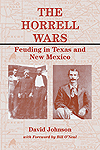
The Horrell Wars: Feuding in Texas and New Mexico, by David Johnson, University of North Texas Press, Denton, 2014, $24.95
Of seven Horrell brothers from Lampasas, Texas, one was killed in Confederate service during the Civil War and five were shot in the decade thereafter. Only one, Sam Horrell Jr., died of natural causes at a ripe old age. In the face of such facts it’s not surprising the Horrells earned a reputation for wildness, lawlessness or, at the very least, just being trouble. That trouble went with the Horrell name there can be no dispute, but in The Horrell Wars author David Johnson tries to take a neutral stand as he describes their various activities and how they were viewed by enemies and supporters alike. He finds much evidence the Horrells were not instigators or perpetrators so much as a family trying to survive in an environment in which rectitude was all too often settled via a gun barrel.
The evidence he cites is partly in print and partly from the memories of Horrell and Higgins descendants and the friends who aided the respective clans in a series of escalating vengeful bloodbaths that began in Lampasas, followed the Horrells into New Mexico Territory and returned with them to Texas. Neither the longest nor bloodiest of Texas feuds, the violence that dogged the Horrells had its series of climaxes from 1873 through 1879, with the odd lynching or shooting sputtering over into the next decade.
But while events seemed to swirl around the Horrells, were they truly the driving force, or is this yet another case of history being dictated by the victors…or survivors? Sorting through the partisanship behind each account, Johnston finds the Horrells’ notoriety suspicious in view of the fact none of the brothers died under circumstances that could objectively be called legal. While they were certainly hard cases, so were their adversaries, such as gunman John Pinckney “Pink” Higgins. Johnson does point to one fault that led to their undoing: “Their judgment regarding those they considered friends is questionable to say the least. Their support for Wash Short ended with their names being tarnished.…Similarly, their trust in Bill Crabtree led to betrayal and ultimately death.”
Whatever the truth, the reader may sort it out for himself from the evidence and testimony the author presents for each incident. Between that sorting out and a generous body count, The Horrell Wars should provide the jaded Wild West reader with a fresh bit of Western lore, even while brushing up against a few more familiar names, such as L.G. Murphy of Lincoln County War fame and Texas Ranger Major John B. Jones, who sought to negotiate an end to the Horrell-Higgins feud in July 1877, complete with a signed treaty.
Jon Guttman




